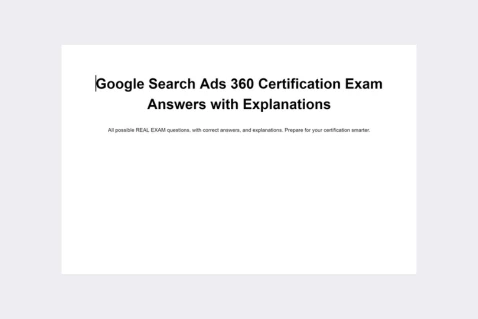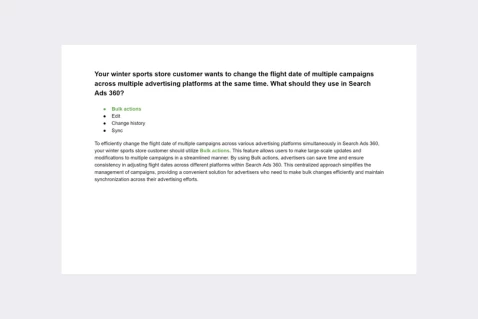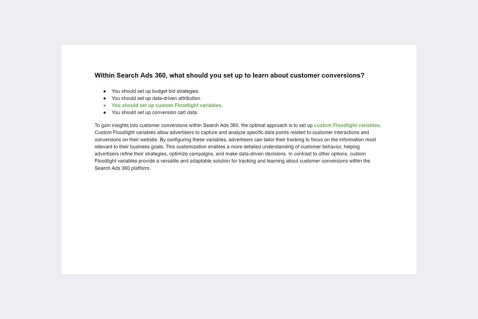Your customer, a local car dealership, frequently changes keywords in their campaign based on the previous week's sales. What should your customer use with their data-driven attribution model in Search Ads 360 to make sure the campaigns are updated correctly?
Multichannel groupings
Custom channel groupings
Automated channel groupings
Keyword groupings
Certification program: 👉 Google Search Ads 360 certification exam
Explanation: To ensure that the local car dealership’s campaigns are updated correctly in their data-driven attribution model within Search Ads 360, the recommended solution is to “use Automated channel groupings.” Automated channel groupings in Search Ads 360 enable advertisers to dynamically categorize and update their campaigns based on performance data. In the context of a local car dealership frequently changing keywords, automated channel groupings allow for the automatic adjustment of campaign groupings based on real-time insights. This ensures that the attribution model accurately reflects the impact of different keywords on the dealership’s sales. Unlike Multichannel groupings or Custom channel groupings, which may require manual adjustments, Automated channel groupings streamline the process, allowing the dealership to adapt its campaigns effectively and optimize performance within the data-driven attribution model.
Passing exams is not a workout. Multiple attempts won’t make you stronger.



- All possible Search Ads 360 certification exam questions with answers, and explanations.
- Real certification exam questions
- Detailed answer explanations.
- Reflects exactly the latest real exam questions.
- Free lifetime updates.
In the dynamic and competitive landscape of automotive marketing, local car dealerships must adapt their advertising strategies quickly to reflect changes in sales trends and consumer behavior. One effective approach for optimizing campaign performance is to leverage a data-driven attribution model in Search Ads 360, which enables advertisers to accurately attribute conversions to various touchpoints along the customer journey. However, to ensure that campaigns are updated correctly based on the previous week’s sales, the dealership should integrate real-time sales data with their attribution model.
By integrating real-time sales data into Search Ads 360, the dealership can gain valuable insights into the impact of their advertising efforts on actual vehicle sales. This integration allows advertisers to attribute conversions not only to online interactions, such as ad clicks or website visits but also to offline actions, such as showroom visits or vehicle purchases. With access to this comprehensive data, the dealership can make informed decisions about adjusting keywords and optimizing campaign performance to align with current sales trends.
One essential feature to utilize in conjunction with the data-driven attribution model is the automated rules functionality in Search Ads 360. Automated rules enable advertisers to set predefined conditions and actions based on performance metrics, allowing for automated adjustments to campaigns in real-time. For example, the dealership can create rules that automatically increase bids or add new keywords to campaigns if certain sales thresholds are met or exceeded during the previous week. Conversely, if sales decline, the rules can decrease bids or pause underperforming keywords to conserve budget and optimize ROI.
Moreover, by leveraging the forecasting capabilities of Search Ads 360, the dealership can anticipate changes in sales trends and proactively adjust their advertising strategies accordingly. The platform’s forecasting tools provide insights into expected performance metrics based on historical data and market trends, enabling advertisers to make informed decisions about budget allocation and campaign optimization. By incorporating sales forecasts into their data-driven attribution model, the dealership can ensure that campaigns are updated preemptively to capitalize on emerging opportunities or mitigate potential challenges.
In conclusion, integrating real-time sales data with a data-driven attribution model in Search Ads 360 empowers local car dealerships to optimize their advertising strategies based on current sales trends and consumer behavior. By leveraging automated rules and forecasting capabilities, advertisers can automate campaign adjustments and anticipate changes in market dynamics, ultimately driving greater efficiency and effectiveness in their digital marketing efforts.
Discover our best-value guides
- Special Bundle Offer Google_Ads_Roll
- Special Bundle Offer HubSpot_Exams_Roll
- Special Offer Unchained_Guru_Roll
- Special Bundle Offer Amazon_Roll
- Special Bundle Offer Google_Analytics_Roll
- Special Bundle Offer Google_SkillShop_Roll
- Special Bundle Offer Marketing_Platforms_Roll
- Special Bundle Offer Microsoft_Advertising_Roll
- Special Bundle Offer YouTube_Roll
- Special Bundle Offer Google_Android_Roll
- Ultimate PMP certification preperation guide
- Google Cloud Professional Architect Certification Exam Answers - Ultimate Guide
- Special Bundle Offer SEMrush_Roll